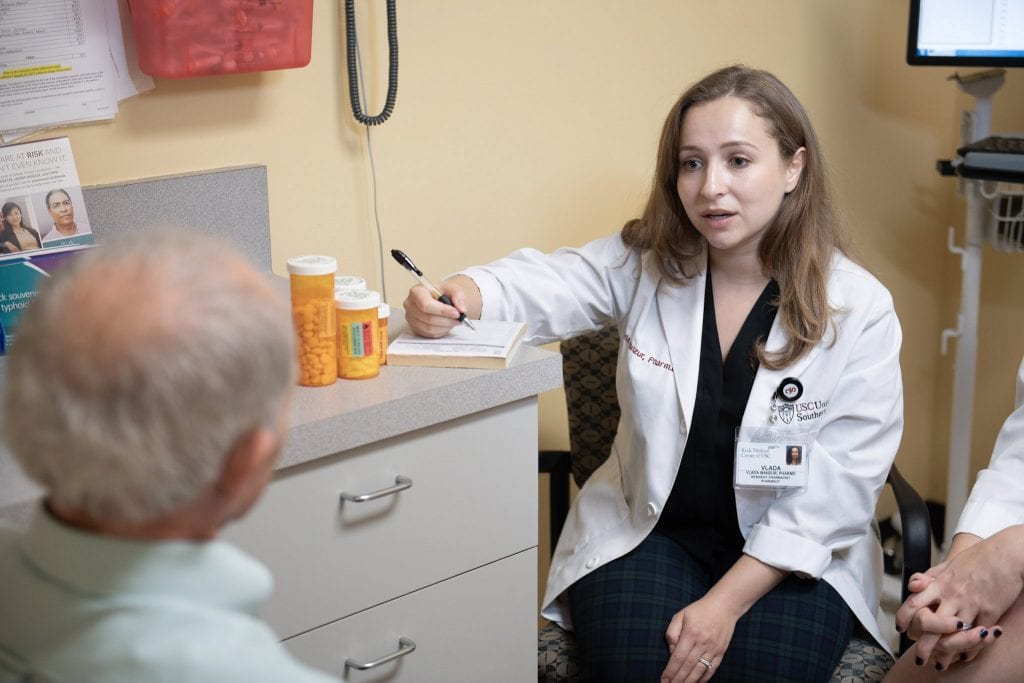Please describe your current work and career highlights.
Currently I work as a clinical pharmacist at the Kaiser Woodland Hills Pain Management Clinic. Upon graduating from USC School of Pharmacy in 2013, I worked as a community pharmacist with CVS for four years. As a community pharmacist, I had the unique experience of observing how changes in healthcare affect our communities in real time. Whether it was legislative movements or health epidemics like the flu and opioid crisis, I would see the needs of my patients regularly changing and evolving. I wanted my expertise to evolve alongside the needs of my patients, so I turned to my mentors at the School and eventually secured a community-based pharmacy practice residency focusing on pain management and opioid medication safety.
How did the resources and faculty members at USC help prepare you for what you are doing now?
When I reached out to my mentors at USC, I was introduced to a unique opportunity to join the team of community-based pharmacy practice residents in 2017. My residency program focused on pain management and opioid medication safety and I helped Dr. Melissa Durham develop and implement a community-based pain medication management program at the USC Medical Plaza Pharmacy — the first of its kind.
Returning to USC and working with Dr. Durham showed me that pharmacists are more than just the middlemen between the provider and the patient. Medicine is shifting from traditional interventions in patient care to motivational interviewing and shared decision-making, and USC is training future pharmacists to be on the front line of this change. Working with patients directly, I saw how I was a more effective clinician when I was able to help patients make better clinical decisions for themselves and not just telling them what I know. Everyone has different driving forces and taking the time to figure out what motivates your patients can make the difference in clinical outcomes. This new perspective on patient care has helped me see my patients in a new light, made me a better clinician and prepared me for my current position with Kaiser.
What attracted you to the field of pharmacy? Any particular moment(s) that made you stop and think, “This is the path I want to take?”
Even as a small child, I always knew I wanted to be in healthcare. I was attracted to the field of pharmacy because it felt big to me. Growing up, I had a family member who was ill and there was a period of time in my life where I was no stranger to frequent visits to hospitals and pharmacies. During this time, I learned a lot about the roles of different health care professions and felt as though pharmacy was the most all-encompassing. The pharmacists I encountered along this journey always remembered to look at the patient (my family member included) as a whole instead of narrowing focus to the disease state they were actively treating. As I continued down my professional path, I learned that not only were pharmacists clinically all-encompassing, but that the profession itself was boundless.
What advice do you have for students who may be interested in following a similar path to yours?
Most students follow the traditional path of applying to residency in their fourth year of pharmacy school and transitioning straight into a residency program. I, however, returned to USC to complete my residency after four years of community pharmacy practice. Whether you take the traditional path or pave your own, having the support of the Trojan Family, co-residents, mentors and like-minded passionate pharmacists really helped me develop as a person and as a pharmacy professional. They can do the same for you.
In general, how do you feel about the outlook for the pharmacy profession?
Our profession is changing and evolving. Although opportunities in traditional pharmacy roles may not be as robust as they once were, I truly believe it’s an exciting time to be a pharmacist. Pharmacists have so many more opportunities to directly impact patient care than ever before and as our healthcare industry advances, I can see the next generation of pharmacists as active members of the interdisciplinary healthcare team, directing its course.


